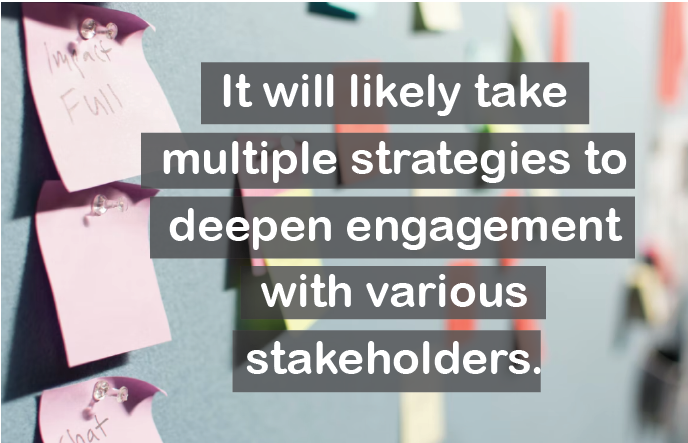In honor of CTE month, CCTS is focusing on the role that families and communities play in increasing partnerships between Special Education and Career and Technical Education staff. Family/caregiver engagement has a significant and positive impact on students’ engagement in school, their grades, the courses they select, and their post-school outcomes.
Families and caregivers also have an important role to play in partnerships with the community. They provide inroads to community involvement which, in turn, provides a deeper understanding of local employment and occupational trends and needs.
We hope that this newsletter provides you with a few ideas in how to strengthen relationships with families/caregivers and increase inclusionary practices in CTE classrooms.



Strategies to Involve Families/Caregivers
"Keep in mind that students, family members and community representatives each have multiple identities and that it will likely take multiple strategies to deepen engagement with various stakeholders."
"Remember that students and their family members may share identities, or they may have different identities and challenges (e.g., students and their parents/caregivers may or may not share a disability in common)."
Association for Career Technical Education, 2021
Ensure that families understand CTE
- CTE provides skills that enable high school graduates to be competitively employed after leaving high school. They may also have the skills to enter certificate programs, community college programs, and 4-year degree programs. CTE courses are for all students.
- CTE programs are offered as a sequence of courses in different career clusters. We know that there is a stronger impact for students if they can take three or four courses in one pathway.
- CTE courses can provide opportunities for students to experience an area of interest, and then build upon that interest with training and skills they need to be competitively employed.
- There may be opportunities for work-based experiences or internships that strengthen students’ skills and helps to clarify their interests.
Communicate regularly with families
- Provide information in multiple languages and accessible formats and learn about families’ specific needs.
- Share information from CTE about courses and career pathways available to their student.
- Involve parents in the academic and career planning process.
- Ensure parents are invited, active participants in IEP meetings. This is an ideal place to share graduation and transition plans with the High School and Beyond Plan.
- Provide information to families about the school career planning process and advising from counselors, CTE, and general education teachers.
- Make it a point to share good news! Celebrate academic and career successes.
Involve families in career planning activities
- Build upon connections families have to the community.
- Invite parents to be mentors, guest speakers, or provide work-based learning opportunities.
- Invite families to participate in mock interviews.
- Recruit family and community members to serve on advisory boards and work teams.
Share Support Services
- Provide information to families about community organizations including advocacy organizations.
- Provide information about services like “dress for success” closets, food pantries, medical care, and other needed services.
- Connect students and families with mentors who reflect their identity and share their racial/ethnic/gender/special population identities (including alumni, family, and community members).


Reference
Association for Career and Technical Education. (2021, September). Engaging Families and Communities to Support Special and Underserved Populations in CTE. Retrieved Feb. 2022 from https://www.acteonline.org/wp-content/uploads/2021/08/ACTE-Engaging-Families-Communities-Sept2021.pdf
Additional Sources
Harvey MW, Rowe DA, Test DW, et al. Partnering to Improve Career and Technical Education for Students with Disabilities: A Position Paper of the Division on Career Development and Transition. Career Development and Transition for Exceptional Individuals. 2020;43(2):67-77. https://journals.sagepub.com/doi/10.1177/2165143419887839
Schmalzried, J. E., & Harvey, M. W. (2014). Perceptions of Special Education and Career and Technical Education Collaboration and Communication. Career Development and Transition for Exceptional Individuals, 37(2), 84–96. https://journals.sagepub.com/doi/10.1177/2165143412467666

Resources Worth Reviewing
Engaging Families and Communities to Support Special and Underserved Populations in CTE (PDF)
From the Association for Career and Technical Education (ACTE), this informative report includes helpful definitions, actionable strategies, and links to additional resources.
Increasing Learner Enrollment in CTE Programs Parent/Guardian Engagement Tool (PDF)
From Advance CTE, this tool includes a series of steps and guiding questions, designed to support schools in creating their own strategies for engaging with parents/caregivers.
Engaging Families and Learners (website)
If you’re looking to dig deeper, there’s a section of Advance CTE’s website dedicated to research, case studies, tools, and additional resources.

IPP on the CCTS Website
If you missed any workshops from the 2020-21 school year, PowerPoint slide decks from all our presentations are available on the CCTS website. Recording links are also available for many of the trainings.
- About the Inclusionary Practices Project
- Inclusionary Practices Project ResourcesInclusionary Practices Project Resources
- Recordings and PPTs from previous trainings
- Newsletter archive
- Examples and best practices
